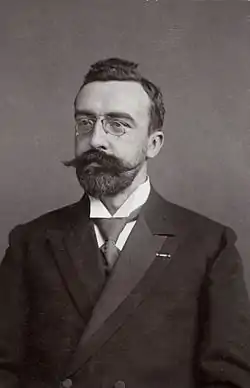Piet Aalberse Sr.
Petrus Josephus Mattheus "Piet" Aalberse Sr. (27 March 1871 – 5 July 1948) was a Dutch politician of the defunct General League of Roman Catholic Caucuses (ABRK) later the Roman Catholic State Party (RKSP) and later co-founder of the Catholic People's Party (KVP) now merged into the Christian Democratic Appeal (CDA) party and jurist. He was granted the honorary title of Minister of State on 31 December 1934.[1]
Piet Aalberse | |
|---|---|
 Piet Aalberse in 1918 | |
| Member of the Council of State | |
| In office 10 November 1937 – 1 April 1946 | |
| Vice President | Frans Beelaerts van Blokland |
| Speaker of the House of Representatives | |
| In office 7 May 1936 – 9 November 1937 | |
| Preceded by | Charles Ruijs de Beerenbrouck |
| Succeeded by | Josef van Schaik |
| Leader of the Roman Catholic State Party | |
| In office 31 May 1933 – 11 November 1937 | |
| Preceded by | Charles Ruijs de Beerenbrouck |
| Succeeded by | Laurentius Nicolaas Deckers |
| Parliamentary leader in the House of Representatives | |
| In office 15 September 1931 – 7 May 1936 | |
| Preceded by | Willem Hubert Nolens |
| Succeeded by | Carel Goseling |
| Parliamentary group | Roman Catholic State Party |
| Minister of Labour, Commerce and Industry | |
| In office 1 January 1923 – 4 August 1925 | |
| Prime Minister | Charles Ruijs de Beerenbrouck |
| Preceded by | Charles Ruijs de Beerenbrouck as Minister of Agriculture, Commerce and Industry Himself as Minister of Labour |
| Succeeded by | Dionysius Koolen |
| Minister of Labour | |
| In office 25 September 1918 – 1 January 1923 | |
| Prime Minister | Charles Ruijs de Beerenbrouck |
| Preceded by | Office established |
| Succeeded by | Himself as Minister of Labour, Commerce and Industry |
| Member of the House of Representatives | |
| In office 15 September 1925 – 9 November 1937 | |
| In office 24 February 1903 – 21 June 1916 | |
| Parliamentary group | Roman Catholic State Party (1926–1937) General League of Roman Catholic Caucuse (1903–1926) |
| Personal details | |
| Born | Petrus Josephus Mattheus Aalberse 27 March 1871 Leiden, Netherlands |
| Died | 5 July 1948 (aged 77) The Hague, Netherlands |
| Nationality | Dutch |
| Political party | Catholic People's Party (from 1945) |
| Other political affiliations | Roman Catholic State Party (1926–1945) General League of Roman Catholic Caucuse (until 1926) |
| Spouse(s) | Elisabeth Schmier
(m. 1898; |
| Children | Piet Aalberse Jr. (1910–1989) and 7 daughters |
| Alma mater | Leiden University (Bachelor of Laws, Master of Laws) |
| Occupation | Politician · Civil servant · Jurist · Lawyer · Prosecutor · Researcher · Academic administrator · Nonprofit director · Editor · Author · Professor |
Alberse applied at the Leiden University in June 1891 majoring in Law and obtaining an Bachelor of Laws degree in July 1893 and worked as a student researcher before graduating with an Master of Laws degree in July 1897. Alberse worked as a lawyer in Leiden from August 1897 until April 1901. Alberse also worked as editor of the newspapers De Tijd and the De Maasbode from November 1898 until 25 September 1918. Alberse served on the Municipal Council of Leiden from September 1899 until September 1918 and served as an Alderman in Leiden from September 1901 until February 1903. Alberse became a Member of the House of Representatives after the death of Herman Schaepman, serving from 24 February until 21 June 1916. Alberse worked as a professor of Administrative law and Labour law at the Delft Institute of Technology from 21 June 1916 until 25 September 1918. After the election of 1918 Alberse was appointed as the first Minister of Labour in the Cabinet Ruijs de Beerenbrouck I, taking office on 25 September 1918. After the election of 1922 Alberse continued as Minister of Labour in the Cabinet Ruijs de Beerenbrouck II, taking office on 18 September 1922. On 1 January 1923 the Ministry of Labour and the Ministry of Agriculture, Commerce and Industry where combined to form the Ministry of Labour, Commerce and Industry with Alberse continuing in the post as the newly renamed Minister of Labour, Commerce and Industry. After the election of 1925 Alberse was not giving a cabinet post in the new cabinet, the Cabinet Ruijs de Beerenbrouck II was replaced by the Cabinet Colijn I on 4 August 1925. Alberse subsequently returned as Member of the House of Representatives as a frontbencher, taking office on 15 September 1925. After the Leader of the Roman Catholic State Party and Parliamentary leader of the Roman Catholic State Party in the House of Representatives Willem Hubert Nolens announced his retirement from national politics Charles Ruijs de Beerenbrouck was nominated as his successor as Leader and Alberse was selected as Parliamentary leader in the House of Representatives, taking office on 15 September 1931. After the Leader of the Roman Catholic State Party Charles Ruijs de Beerenbrouck was elected as Speaker of the House of Representatives he subsequently stepped down as Leader in favor of Alberse on 31 May 1933.
Biography
Early life
He was born in Leiden to confectioner Bartholomeus Hendricus Johannes Aalberse and Johanna Kerkvliet. He attended a catholic elementary school in Katwijk and studied Dutch Language and Jurisprudence at Leiden University. After graduating in 1897, Aalberse became a lawyer and attorney in Leiden.
Politics
Alderman and House of Representatives
Aalberse was elected into the municipal council of Leiden in 1899, and became alderman of Marital Status, Social Affairs and Public Hygiene of the city in 1901. He gave up both positions in 1903, when he was elected into the House of Representatives for the constituency of Almelo. In the House, he was mainly concerned with policy regarding labour, trade and industry. After losing his seat in 1916, Aalberse briefly taught at the Delft University of Technology.
Minister
In 1918, Aalberse became the Netherlands' first minister of Labour, a position renamed minister of Labour, Trade and Industry in 1922. As minister, Aalberse was responsible for the introduction of child benefits for public servants, the introduction of a subsidy programme to stimulate private construction of residences, and the fixing of eight-and-a-half-hour work days and 48-hour working weeks. His term ended in 1925. After serving as minister, Aalberse returned to the House of Representatives.
Speaker of the House and Council of State
In the House, he was leader of the Catholic group from 1931 to 1936, and served as Speaker of the House of Representatives from 1936 to 1937, when he lost his seat. Aalberse ended his political career as member of the Council of State, from 1937 to 1946.
Personal
On 21 July 1898, Aalberse married Elisabeth Johanna Maria Schmier, with whom he had seven daughters and one son. He was member of the "Raad der Vereniging" of De Nederlandsche Padvinders from 1936 till 1947.
Decorations
| Honours | ||||
| Ribbon bar | Honour | Country | Date | Comment |
|---|---|---|---|---|
| Knight of the Order of the Netherlands Lion | Netherlands | 24 February 1911 | ||
| Commander of the Order of Orange-Nassau | Netherlands | 31 August 1938 | Elevated from Officer (31 August 1911) | |
| Honorific Titles | ||||
| Ribbon bar | Honour | Country | Date | Comment |
 |
Minister of State | Netherlands | 31 December 1934 | Style of Excellency |
References
- "Aalberse, Petrus Josephus Mattheus (1871-1948)" (in Dutch). Huygens ING. 12 November 2013. Retrieved 21 August 2019.
- Schemmel, B. "Netherlands ministries, etc". Rulers.org. Retrieved 2007-02-16.
- Maassen, Joop. "Petrus Josephus Mattheus Aalberse". Biografisch Woordenboek van het Socialisme en de Arbeidersbeweging in Nederland (in Dutch). Internationaal Instituut voor Sociale Geschiedenis. Retrieved 2007-02-16.
- Doel en werkwijze. De Nederlandse Padvinders.
External links
| Wikimedia Commons has media related to Piet Aalberse (1871-1948). |
- (in Dutch) Mr. P.J.M. (Piet) Aalberse Parlement & Politiek
| House of Representatives of the Netherlands | ||
|---|---|---|
| Preceded by Herman Schaepman |
Member for Almelo 1903–1916 |
Succeeded by Arnold Engels |
| Party political offices | ||
| Preceded by Willem Hubert Nolens |
Parliamentary leader of the Roman Catholic State Party in the House of Representatives 1931–1936 |
Succeeded by Carel Goseling |
| Preceded by Charles Ruijs de Beerenbrouck |
Leader of the Roman Catholic State Party 1933–1937 |
Succeeded by Laurentius Nicolaas Deckers |
| Political offices | ||
| Preceded by Office established |
Minister of Labour 1918–1923 |
Succeeded by Himself as Minister of Labour, Commerce and Industry |
| Preceded by Charles Ruijs de Beerenbrouck as Minister of Agriculture, Commerce and Industry Himself as Minister of Labour |
Minister of Labour, Commerce and Industry 1923–1925 |
Succeeded by Dionysius Koolen |
| Preceded by Charles Ruijs de Beerenbrouck |
Speaker of the House of Representatives 1936–1937 |
Succeeded by Josef van Schaik |
| Non-profit organization positions | ||
| Preceded by Unknown |
Chairman of The Catholic Scouts 1938–1947 |
Succeeded by Unknown |
